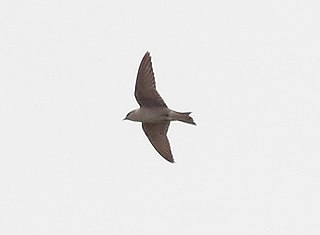The yellow serotine is a species of vesper bat.
The white-winged serotine is a species of vesper bat.

Leptodactylus melanonotus is a species of frog in the family Leptodactylidae. It is found in Central America. Its natural habitats are subtropical or tropical dry forests, subtropical or tropical moist lowland forests, subtropical or tropical mangrove forests, subtropical or tropical moist montane forests, dry savanna, moist savanna, subtropical or tropical seasonally wet or flooded lowland grassland, intermittent freshwater lakes, freshwater marshes, intermittent freshwater marshes, pastureland, plantations, rural gardens, urban areas, heavily degraded former forest, water storage areas, ponds, and canals and ditches.
Odorrana versabilis is a species of frog in the family Ranidae that is endemic to China.

The Peruvian martin is a species of bird in the family Hirundinidae. It is found in Peru and far norther Chile.
Blakea acostae is a species of plant in the family Melastomataceae. It is endemic to Ecuador. Its natural habitat is subtropical or tropical moist montane forests.
Blakea campii is a species of plant in the family Melastomataceae. It is endemic to Ecuador. Its natural habitat is subtropical or tropical moist montane forests.

Blakea eriocalyx is a species of plant in the family Melastomataceae. It is endemic to Ecuador. Its natural habitat is subtropical or tropical moist montane forests.
Blakea formicaria is a species of plant in the family Melastomataceae. It is endemic to Ecuador. Its natural habitat is subtropical or tropical moist montane forests.

Blakea glandulosa is a species of plant in the family Melastomataceae. It is endemic to Ecuador. Its natural habitats are subtropical or tropical moist lowland forests and subtropical or tropical moist montane forests.
Blakea harlingii is a species of plant in the family Melastomataceae. It is endemic to Ecuador. Its natural habitat is subtropical or tropical moist montane forests.
Blakea hispida is a species of plant in the family Melastomataceae. It is endemic to Ecuador. Its natural habitats are subtropical or tropical moist lowland forests and subtropical or tropical moist montane forests.
Blakea incompta is a species of plant in the family Melastomataceae. It is endemic to Ecuador. Its natural habitat is subtropical or tropical moist montane forests.
Blakea involvens is a species of plant in the family Melastomataceae. It is endemic to Ecuador. Its natural habitats are subtropical or tropical moist lowland forests and subtropical or tropical moist montane forests.
Blakea languinosa is a species of plant in the family Melastomataceae. It is endemic to Ecuador. Its natural habitat is subtropical or tropical moist montane forests.
Blakea madisonii is a species of plant in the family Melastomataceae. It is endemic to Ecuador. Its natural habitat is subtropical or tropical moist montane forests.

Blakea oldemanii is a species of plant in the family Melastomataceae. It is endemic to Ecuador. Its natural habitat is subtropical or tropical moist montane forests.
Blakea pichinchensis is a species of plant in the family Melastomataceae. It is endemic to Ecuador. Its natural habitat is subtropical or tropical moist montane forests.
Blakea rotundifolia is a species of plant in the family Melastomataceae. It is endemic to Ecuador. Its natural habitat is subtropical or tropical moist montane forests.
Blakea subvaginata is a species of plant in the family Melastomataceae. It is endemic to Ecuador. Its natural habitat is subtropical or tropical moist montane forests.





